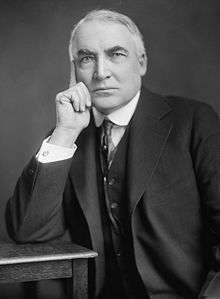Return to normalcy
Return to normalcy, a return to the way of life before World War I, was United States presidential candidate Warren G. Harding's campaign slogan for the election of 1920. Although detractors of the time tried to belittle the word "normalcy" as a neologism as well as a malapropism, saying that it was poorly coined by Harding (as opposed to the more accepted term normality), there was contemporaneous discussion and evidence that normalcy had been listed in dictionaries as far back as 1857.[1] Harding's promise was to restore the United States' pre-war mentality, without the thought of war tainting the minds of the American people. To sum up his points, he stated:
America's present need is not heroics, but healing; not nostrums, but normalcy; not revolution, but restoration; not agitation, but adjustment; not surgery, but serenity; not the dramatic, but the dispassionate; not experiment, but equipoise; not submergence in internationality, but sustainment in triumphant nationality.[2]

1920 election
Harding's position attracted support and was important during the 1920 United States presidential election, which he won with 60.3% of the popular vote.[3]
During the campaign, Harding addressed the issue of the word's origin, claiming that "normalcy" but not "normality" appeared in his dictionary:
I have noticed that word caused considerable news editors to change it to "normality". I have looked for "normality" in my dictionary and I do not find it there. "Normalcy", however, I did find, and it is a good word.[4]
See also
- Creeping normalcy
References
- "The Mavens' Word of the Day: normalcy", June 25, 1999, randomhouse.com.
- "Return to Normalcy". teachingamericanhistory.org. Archived from the original on 2006-10-03.
- "Election of 1920: Republican and the Return to Normalcy".
- Kory Stamper (29 October 2013). "Obama didn't use improper grammar. Cut him and other public figures a break". The Guardian. Guardian News and Media Limited. Retrieved 23 February 2014.
External links
| Look up normalcy in Wiktionary, the free dictionary. |
- "Normalcy", The New Dictionary of Cultural Literacy, 3rd ed., edited by E. D. Hirsch, Jr., et al. Boston: Houghton Mifflin, 2002. ISBN 0-618-22647-8.
- "A Time for Normalcy" by Evan Jenkins, Columbia Journalism Review, January/February 2002.